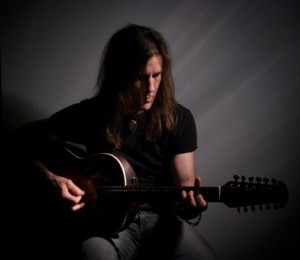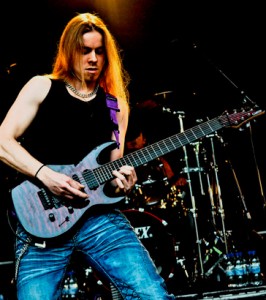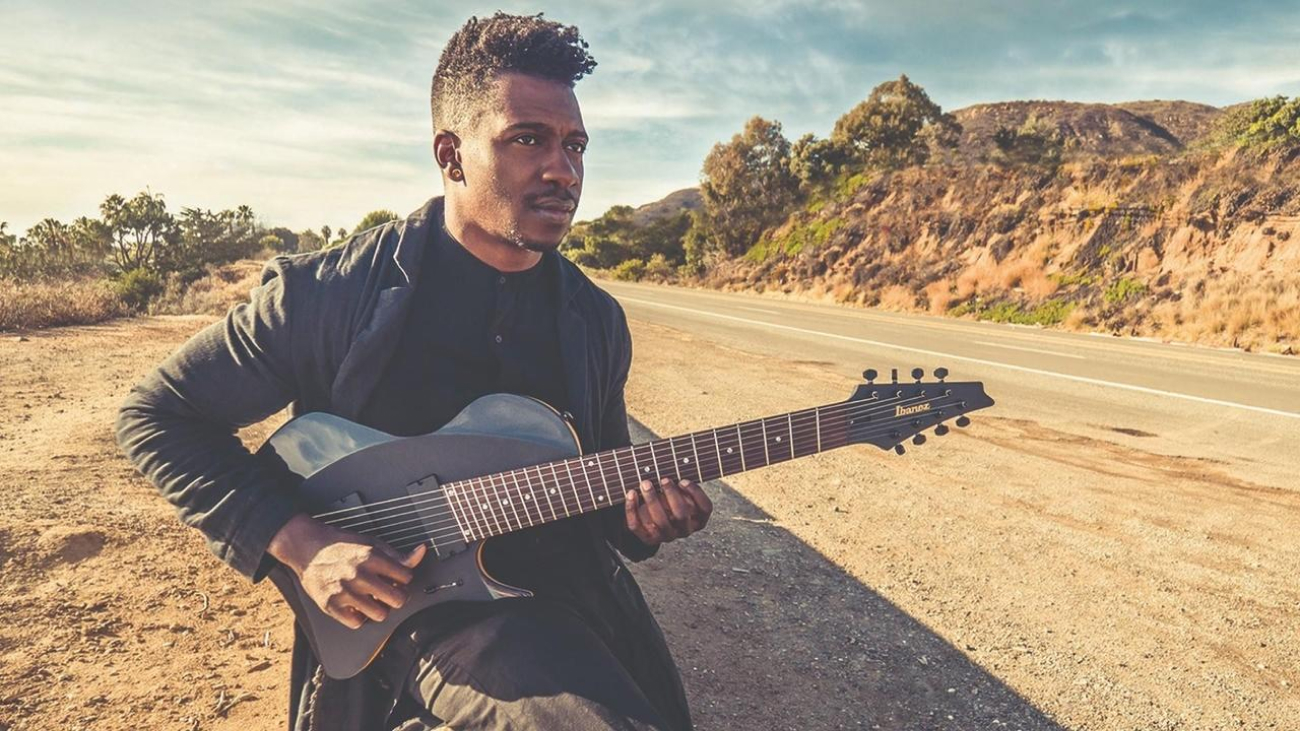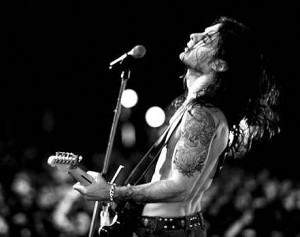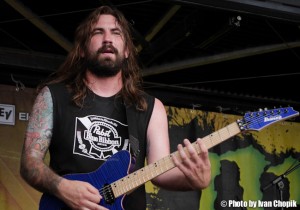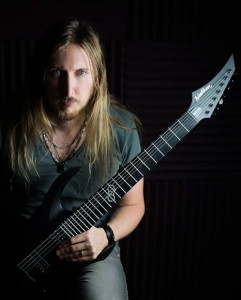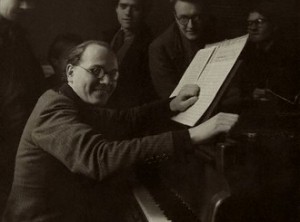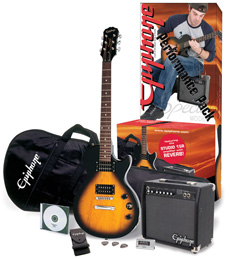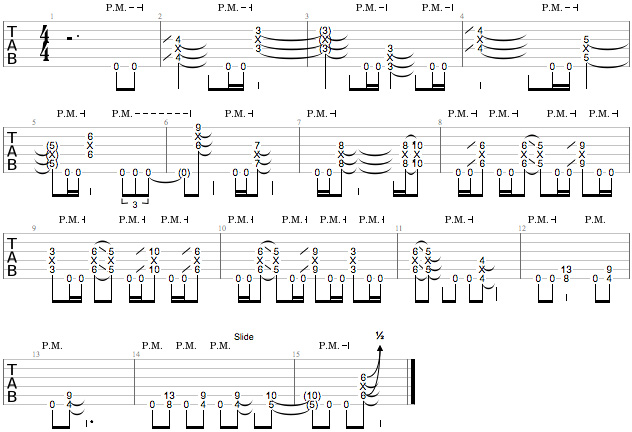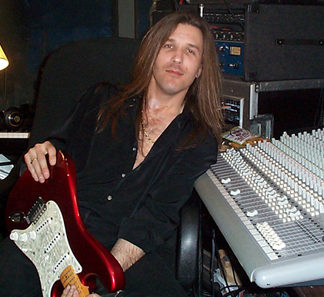 George Bellas is a guitar virtuoso and one of the leaders of the neoclassical scene, with three solo albums released and a truly unique musical style that combines some of the scariest technique out there with very intricate compositions. Check out www.georgebellas.com for news on his upcoming two records, which will be released later this year.
George Bellas is a guitar virtuoso and one of the leaders of the neoclassical scene, with three solo albums released and a truly unique musical style that combines some of the scariest technique out there with very intricate compositions. Check out www.georgebellas.com for news on his upcoming two records, which will be released later this year.
IC: How did you get started with playing guitar and studying music in general?
GB: I was 7 years old and ever since I was really young, I remember my folks playing Frank Zappa records and I always had an affection for music. One day, my dad took (I have a brother and sister), he took us to the shopping mall and I always just asked a bunch about the music section. This music section of the store had some guitars, just really cheap old classical things. I took one down and I fell in love with it like instantly, man. My dad bought the guitar and my sister got a flute that day. All the way home I’m bangin’ on that guitar, making a whole bunch of noise, I’m sure.
I was in third grade then, … and a couple days [after getting the guitar] I went to the school and checked out every single music book I could get a hold of… and there’s not much for a third grader in their library, but anyway that was the start of it all and there was really no major person that made me think ‘Wow, I want to play guitar.’ A lot of people are like ‘the day Hendrix I wanted to play.’ Not me, I just had this burning inner desire and I just loved the instrument. I really don’t know why, Ivan. I just had an instant passion for it. I came home and I never put it down. And then later on I got into all the classic rock bands – Robin Trower, [Led] Zeppelin, Nugent… all that stuff – but I started off just out of a pure passion for it.
IC: What kind of other influences did you have early on?
GB: As we all do, I went through these phases … I mentioned Robin Trower. A lot of guys are shocked when I mention Robin’s name. I was never a big Hendrix fan. I sort of got my bluesy-rock fix through Trower. There was a couple years in my youth where [Robin Trower] is all I would listen to, these long extended bluesy-rock solos. He was one guy, Nugent was another. His guitar solos and just how rowdy he was (and we’re talking really old Nugent). And then of course Schenker. … I remember back in 6th or 7th grade hearing ‘Strangers in the Night’ for the first time, I just stared at my speakers, mesmerized, listening to these solos.
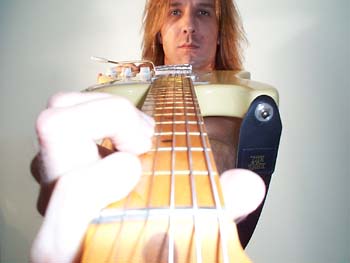 Kiss was another thing. With all due respect to them, we’re not talking high caliber musicianship, but just great aggressive rock tunes, man. And I thought Ace Frehley was pretty super cool. So I listened to that, I just really got energized from that stuff. And then later on I really got into the theory of it, became very very disciplined in my studies and later expanded some more into, I don’t want to say serious music, but classical music and stuff like that, classical jazz music. But I sure got energized by a lot of the rock stuff.
Kiss was another thing. With all due respect to them, we’re not talking high caliber musicianship, but just great aggressive rock tunes, man. And I thought Ace Frehley was pretty super cool. So I listened to that, I just really got energized from that stuff. And then later on I really got into the theory of it, became very very disciplined in my studies and later expanded some more into, I don’t want to say serious music, but classical music and stuff like that, classical jazz music. But I sure got energized by a lot of the rock stuff.
IC: And as far as your composition style is concerned, where do you draw inspiration from?
GB: Probably my biggest source of inspiration is not any music source. If I wasn’t a musician and totally into this, I probably would have done something in the sciences. I really love astronomy and astrophysics and math. Carl Sagan was a great influence on me, just very mind-expanding. …That stuff just inspired me in such a way towards music, it made me try to expand, you know break out of the whole 4/4 common progression. Anyway, a little left-field here, but in all honesty, yeah.
IC: You have an incredible technique and a unique feel to your playing. How did you go about developing this?
GB: Well, thank you very much. I appreciate that compliment. …The technique, I’m assuming you’re talking about physical technique, which a lot of people are so obsessed with these days, in which they’d actually lack composition techniques and other mental techniques, but by all means I understand your question. Physical side of it, yes I did spend a lot of time. People think I was exaggerating… when I mentioned there was a period where I played for 18 hours a day. I would do this for days in a row, then just burn out for a day and kind of catch up with my sleep and then do it again for the next few days. My dad thought I was nuts, but he was very supportive. So I spent a lot of time practicing, very very disciplined practice, not sitting in front of the boob-tube just kind of noodling, but sitting down with the metronome. Just very hard, intense practice.
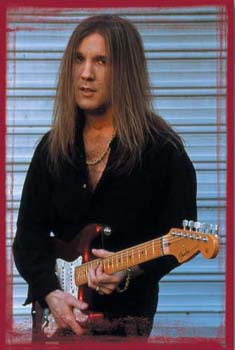 And I also spent years playing this old Fender acoustic that I had 13 gauge strings on. And that’s before I learned about the whole sweep picking thing, (well actually I learned about sweep picking way early on from Jimmy Page’s [Led Zeppelin] ‘Since I’ve Been Loving You’ song where he did this backwards F minor sweep arpeggio, and that set me off, but I didn’t really fully explore the whole sweep picking thing until later on…) But I played this acoustic guitar for years and my fingertips were like black. People would come over and be sort of frightened by my fingertips, because [I used] phosphor bronze strings, so my fingertips would kind of turn green a little bit.
And I also spent years playing this old Fender acoustic that I had 13 gauge strings on. And that’s before I learned about the whole sweep picking thing, (well actually I learned about sweep picking way early on from Jimmy Page’s [Led Zeppelin] ‘Since I’ve Been Loving You’ song where he did this backwards F minor sweep arpeggio, and that set me off, but I didn’t really fully explore the whole sweep picking thing until later on…) But I played this acoustic guitar for years and my fingertips were like black. People would come over and be sort of frightened by my fingertips, because [I used] phosphor bronze strings, so my fingertips would kind of turn green a little bit.
It was really a time span and I actually got carpal tunnel [syndrome]. I could play fine and everything, I’d never had surgery, but I had cortisone and anti-inflammatory injections and a wrist-brace. But it’s all good, and I tried to balance my playing with my composition stuff, so I’m not sitting there playing 18 hours a day, every day. Which is good and bad, man. Good for your technique, but we’re really human, we can only handle so much.
IC: 18 hours a day – that’s quite a while! What kind of practice sessions did you have? You mentioned that they were very organized. How did you divide them up?
GB: Some of them were, and sometimes I would just go with my gut instinct, regarding what I was going to be working on. There was never really a period where I would… maybe there was actually, where I had such a steady regime, where it’s like ‘ok, im gonna wake up 8 o’clock, sight-read from 8:30 to 9:30, then improv from such and such ….’
But I would really, when I learned a new technique or I was working on something, I would practice that to the bone, until I got it. So if there was something that was giving me troubles, like a finger technique or something, I’d just work on it until I got it really comfortably. But then there were periods where I did break it up, where I worked on my sight-reading, my ear training, and composition skills, too. I spent a lot of time actually studying and writing, as well as playing.
IC: Have you received any formal music education?
GB: I didn’t actually go to school. I had a couple private lessons in third grade, when I first got my guitar. Let me back up here a little bit. When I first got that guitar, I’d take a few private lessons, I think it was 3 or 4 lessons. He showed me how to tune the guitar, and the first couple pages out of a Mel Bay book, you know, that kind of thing, and I just ran with it. It might have been easier actually to have somebody to study with, to be able to ask questions, but I sort of did it the hard way, Ivan.
I went to the local universities… down here in Chicago, and bought some really intense books on harmony, counterpoint, and orchestration by Walter Piston. Those were like bibles to me, very classically orientated. I used those for years amongst other books, but that was my resource of upper-scholastic information.
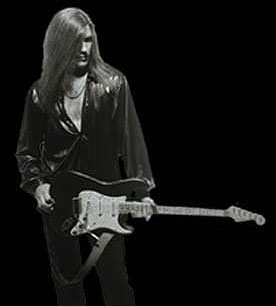 IC: I know you devote a great deal of time to your work, but what kinds of things do you like to do aside from music? You mentioned science as being one of them.
IC: I know you devote a great deal of time to your work, but what kinds of things do you like to do aside from music? You mentioned science as being one of them.
GB: Science is cool, absolutely, very fascinating to me. Besides music, I love just actually going outside and kind of hanging out, riding mountain bikes. I’d love in the summer times just putting down the guitar or pencil from writing music and just hopping on a bike and letting loose. But [I also like] just the simple things in life. I love my little dogs. I’ve got a couple pets and stuff, and I love them to death, man. I love a cool movie, just like the next guy.
But I’m also a big technological geek. I like writing code. I learned C, C+, and some other programming languages, basically to help my students. I devised this 12 CD-Rom instructional series and on top of that I was thinking ‘well, I’m using a web browser, I really want to make a complete application, not relying on a web browser.’ So I learned some coding techniques, but that is purely a hobby of mine, really to help benefit my students… with some basic ear training software and stuff like that.
I also discovered that programming, the detail of it, it’s very much like writing a symphony. All you need to write a symphony is piece of paper and a pencil, and all you need to write Photoshop is a piece of paper and a pencil with computer help, to write the code. And plus, to just have the eye for the detail, all those lines of code and all those lines of music. In my eyes, there’s a lot of similarities and it’s very creative. I mean, I blink an eye and two days go by with that stuff, same thing with writing music.
IC: What kind of music do you listen to nowadays? Are there any guitarists out there whose work you particularly enjoy?
GB: Sometimes I really, especially these past couple of years, as much as I love music, I really have isolated myself. When I work on these records… you ever listen to a tune and then you got that tune stuck in your head all day? Sometimes when I’m writing and in the process of producing the album, which I am right now working on 2 of them, I kind of shut myself out from everybody. Not in a mean way, I just… these two records I’m working on are so unique and original, I’m really really proud of them…. But to answer your question though, there’s lots of great players out there, but I have to be honest and say that I do listen to a lot of classical music when I do listen to music. But there’s a lot of great players out there.
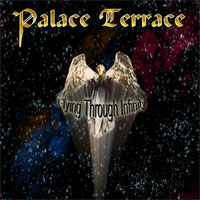 IC: You mentioned you have two new albums coming out this year. How do these upcoming albums differ from your previous releases?
IC: You mentioned you have two new albums coming out this year. How do these upcoming albums differ from your previous releases?
GB: I don’t wanna reveal too much right now, but one of the records, Flying Through Infinity, is gonna be purely a vocal band. It’s a lot of progressive material in combination with some neoclassical stuff, some double-bass tunes. As cool as Yngwie [Malmsteen], Vinnie Moore, and Joe Stump are, those guys are all great players, but I get sort of bored with the songwriting. I think they’re really cool, believe me I’ve listened to all those guys that I mentioned and got all their records and stuff, but I really like to explore odd meters and different progressions that really haven’t been utilized too much. These two records that I ’m working on right now really exploit that idea.The one vocal album, it’s not too out-there. Like I said it’s pretty progressive, a lot of odd meters typical of me, and some cool progressions, some double-bass neoclassical tunes.
But the one instrumental record, Planetary Alignment, that’s the working title for it right now, is by far the most modern rock record that I’ve ever heard. And I don’t mean that it’s good or bad, it’s just definitely the most extreme thing that I’ve ever heard… the use of scales, meters, and the complexity of the counterpoint in there. Can’t wait until these are done, Ivan. And of course there’s gonna be all kinds of guitar all over them, but the writing is… they are similar to ‘Turn of the Millenium’ in the progressive respect, but by far much more mature and I just feel really strong about them.

IC: These will be your fourth and fifth solo albums coming out. Is there a certain musical direction that you’re going for or a vision that you’re trying to achieve with your music in the future?
GB: Well, each record is like a timestamp of a period in my life and so I’m not really working towards a particular sound per se, but each record sort of captures a particular sound. My first record is very much progressive in nature, (there’s one neoclassical tune on there, ‘Ripped to Shreds’). And I’m calling the progressive tunes obviously the ones with the odd meters and whacky progressions and all that, the neoclassical ones with the older progressions, the tonic-dominant based harmony progressions, four-four stuff.
‘Turn of the Millennium’ is more progressive, ‘Mind Over Matter’ I was shooting more for the neoclassical sound (there’s no progressive stuff on that, actually). And then ‘Venomous Fingers’ … is where I really wanted to combine the two. I love the old-school neoclassical and I love the modern stuff, too (odd meters and stuff). So ‘Venomous Fingers’ was a pretty good mix of that. … the new vocal record is another mix of that and ‘Planetary Alignment’ is all just pure progressive. Very progressive.
IC: Do you have any other plans for 2006?
GB: After these two records are done, I’ve got a whole DVD [instructional] series all planned and it’s partially done. But I put those on hold, [because] I kind of got burned out after I did this 12 CD-ROM [instructional series] and went into the separate subjects. It took a lot of time. It wasn’t a million dollar budget thing or anything, but it took a lot of time and the content is pretty cool, but the DVD’s I want to be just spectacular. I want people to be able to put them in their TV and watch them in High Definition. But I’ve got to get these records done first and after these records are done then I’m gonna finish off the DVD’s.
IC: Let’s talk a little bit about your gear on the new albums. Could you tell us about your guitars, amps, effects, etc.?
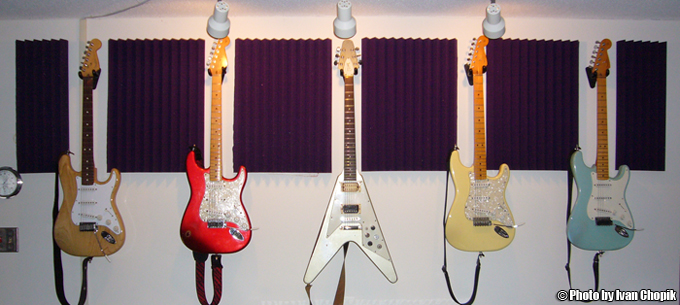
GB: Yeah, absolutely. I’m a pretty big Gibson and Fender guy. Two years ago I came across this awesome Gold-top [Gibson] Les Paul that I just fell in love with the neck and the sound of it is just killer. And I was never a big Paul guy, but I fell in love with this thing and this guitar is all over these two records.
And of course, my [Fender] Strats. My old workhorse, my favorite red Stratocaster amongst the others I use and I’m also a big fan of the [Gibson] Flying V’s, which I actually grew up with. I don’t play them too much anymore, as much as the Strats. When I was a kid, I was like ‘man I can’t play a Strat, everybody plays a Strat. I wanna be different, have a V and the [Gibson] Explorer.’ But I tried the toggle switches for my V’s to try to mimic that Strat single-coil sound and it kind of worked, but not really. So it was later in life that I switched over to Strats. I just gave in. A friend of mine lent me a Strat and it was all over. I went out and bought ten of them.
IC: So you probably used the Les Pauls more for the heavier rhythm stuff and the Strats for leads.
GB: Exactly, but not only for just heavy rhythms. The Paul actually has a nice, smooth, milky sound. Maybe the sound is more the humbucker sound, [which] is not what I’m going after, but it’s just a more … a big lead-tone sound. And no matter how hot pickups you have in your Strat, it seems like it’s just always a little twangier than the fat Les Paul. … I really prefer the ’57 vintage reissue Stratocasters, those are some of my favorites. And I told you about the Paul, and [I also like] the late 70’s early 80’s Flying V’s.
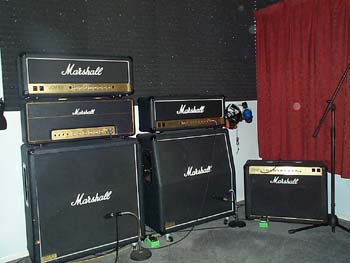 As far as amps, I’m a big Marshall guy. I particularly love the JCM900 series and the 4100 series. These Marshalls are really funny things things, man. Even the same models sound different, depending upon what transformer they had lying around in the factory that day. They all really have their individual tones. But I like the JCM900’s along with the old, early 70’s Mark II, which are great. Yngwie really popularized those, which is killer old Ritchie Blackmore, Robin Trower kind of tone. Not much effects in between my guitar and the amp. I just use one old green Ibanez Tubescreamer, the original one. Those are my favorites. I’ve had all the DOD 250’s, which are a little too green for me. Other people sound great using them, but I really like the Tubescreamer.
As far as amps, I’m a big Marshall guy. I particularly love the JCM900 series and the 4100 series. These Marshalls are really funny things things, man. Even the same models sound different, depending upon what transformer they had lying around in the factory that day. They all really have their individual tones. But I like the JCM900’s along with the old, early 70’s Mark II, which are great. Yngwie really popularized those, which is killer old Ritchie Blackmore, Robin Trower kind of tone. Not much effects in between my guitar and the amp. I just use one old green Ibanez Tubescreamer, the original one. Those are my favorites. I’ve had all the DOD 250’s, which are a little too green for me. Other people sound great using them, but I really like the Tubescreamer.
IC: Do you have a certain preference for strings, picks, and things like that?
GB: Oh yeah man, sure. I don’t use picks, I play all my guitar with my toes (laughs). Guess that would be something, huh? But in all seriousness, I use these Dunlop picks, little Jazz III’s, the black ones and I’ve been on this phase for maybe the past 6 or 7 years. Before that I used to use the purple Tortex picks, the Dunlops. I use Dean Markley strings, [gauge] .10 – .46 on the electrics and .13 – .56 on the acoustic, although I’ve taken it easy the past decade on the 13 gauge strings. They were killer. And I’m not talking about just strumming simple chords and stuff on the acoustic with them, I’m talking about really laying into it and practicing your leads and arpeggios …
IC: And I hear you have some pretty high action set up on your guitars?
GB: Yeah, relatively high. I just really like being able to get underneath the string a little bit. … if the action is too low for me, the strings can kind of slip out from your fingers if you’re bending a note. A lot of players feel you can play faster with lower action, but the speed issue is never a concern of mine. I never tried to play fast. I’ve always just practiced a whole lot with the metronome. A little bit of high action never hurt anybody.
IC: Is there any advice you can give to aspiring musicians?
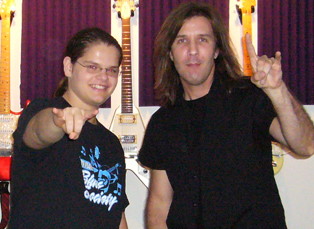 GB: Yeah, great question. Number one is, as everybody I’m sure is well aware of, practice and practice very hard – stay focused. I see a lot of people that think they may be practicing with discipline, where they really could be more disciplined. Maybe you’re sitting in front of a TV and you even have your guitar in your hand, you may be playing a little bit, but it’s not hard practice. You wanna sit down, break a sweat. Really, really practice with great intensity and do it consistently, on a consistent basis. Not a couple hours here one day, skip a few days, try to catch up, but consistently on a daily basis, if at all possible. That’s from my personal experience.
GB: Yeah, great question. Number one is, as everybody I’m sure is well aware of, practice and practice very hard – stay focused. I see a lot of people that think they may be practicing with discipline, where they really could be more disciplined. Maybe you’re sitting in front of a TV and you even have your guitar in your hand, you may be playing a little bit, but it’s not hard practice. You wanna sit down, break a sweat. Really, really practice with great intensity and do it consistently, on a consistent basis. Not a couple hours here one day, skip a few days, try to catch up, but consistently on a daily basis, if at all possible. That’s from my personal experience.
… I never quit learning. I don’t have that kind of attitude where ‘yeah I know enough, I don’t need to learn anymore.’ If I ever get that attitude Ivan, come over here and kick me in the ass, ‘cause that’s just not the case. I’m always open to learning new things and exploring new avenues. But anyways, practice as much as possible and study as much as possible. I see a lot of people overly focused on the physical technique of their instrument and they overlook [the writing of music]. And not everybody wants to write music. Some people just want to play guitar, improvise, and play other people’s music and that’s fine. But for those that really do want to write their own music, make sure you spend time studying counterpoints, your theory, your harmony, and study some classical scores to see how all these notes have been put together by other musicians. My main point would be to practice and balance that with your studies and composition skills as well.



